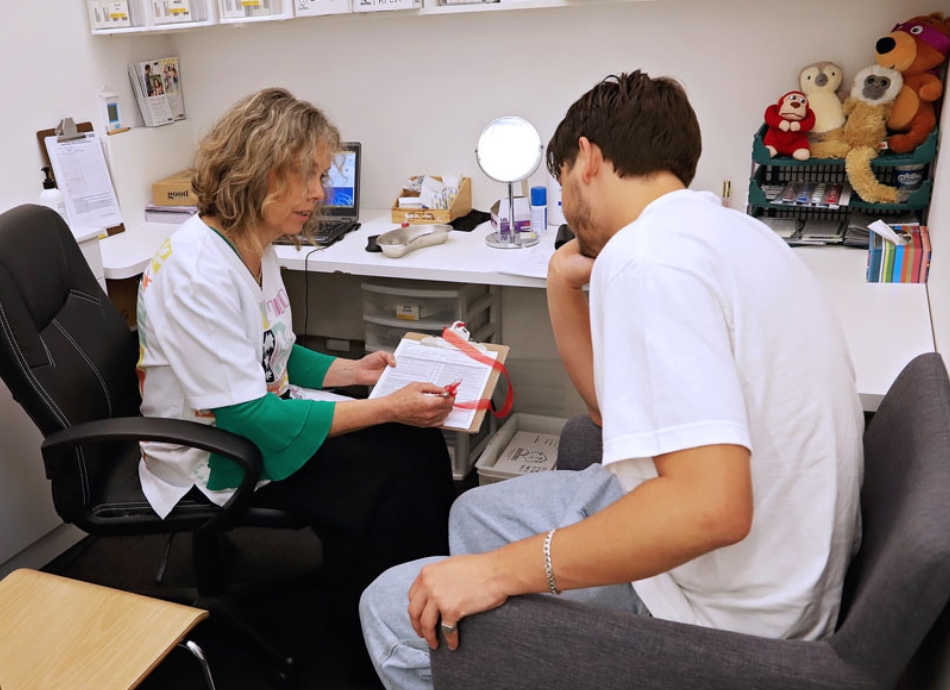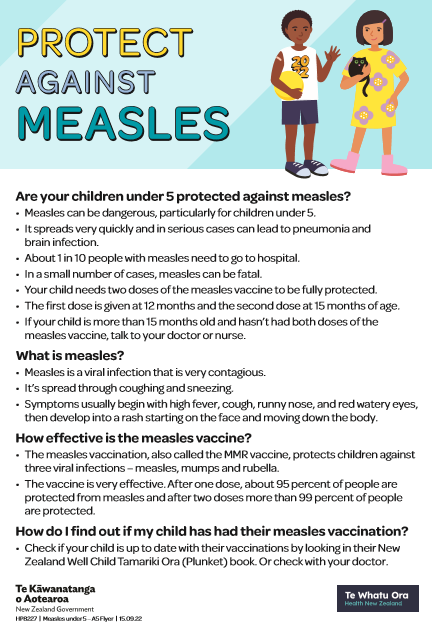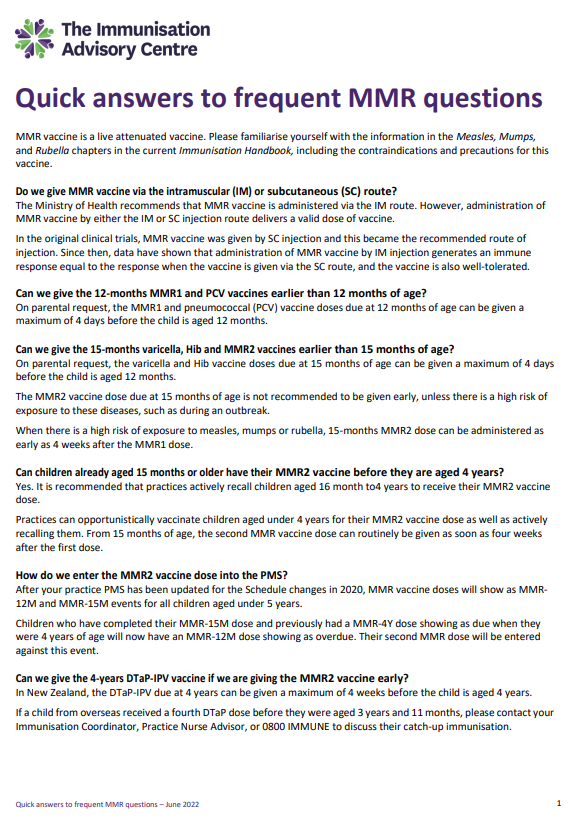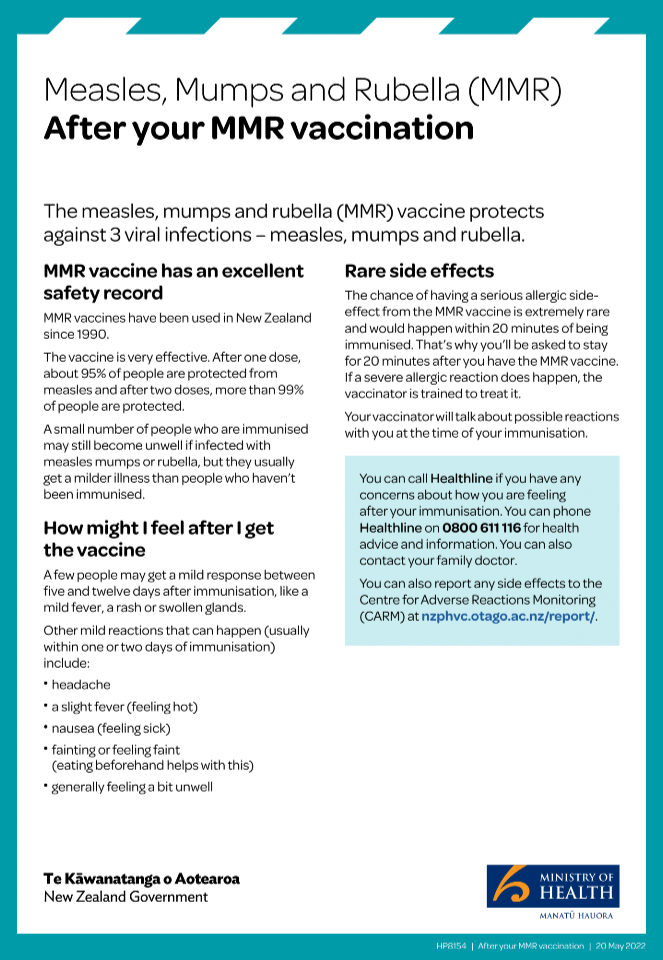Measles, mumps and rubella (MMR) vaccine
Also known as the MMR vaccine
Key points about the measles, mumps and rubella (MMR) vaccine
- The measles, mumps and rubella (MMR) vaccine protects against 3 viral infections – measles, mumps and rubella.
- The vaccine is a live vaccine, which is made using live mumps, measles and rubella viruses that have been weakened (or attenuated).
- There are no single vaccines available for these infections.

MMR vaccine
The MMR is a vaccine that protects you against 3 viral infections – measles, mumps and rubella. There are no single vaccines available for these infections.
Watch a video about measles and the MMR vaccine.
Video: The measles vaccine with Dr Hina Lutui
(Ministry of Health, NZ, 2022)
The vaccine is a live vaccine, which is made using live mumps, measles and rubella viruses that have been weakened (or attenuated).
After vaccination, the weakened vaccine then teaches your immune system to recognise the virus, so it knows how to attack it if it ever comes across it. Read more about live vaccines.
Live attenuated vaccines don't usually cause problems in people who are healthy. If it does cause symptoms of the disease, they're milder than if you had caught the disease.
- Anyone born on/after 1 January 1969 who hasn't had 2 doses of the MMR vaccine should have the MMR vaccine.
- Adults born before 1969 are considered to be immune to measles as measles was very infectious before 1969, and as there was no vaccine available in Aotearoa New Zealand until then most adults were highly likely to be exposed. Find out if you or someone in your whānau need a measles vaccine(external link) by answering a few simple questions. The MMR vaccine may still be needed for protection from mumps and rubella – check with your doctor if you're not sure.
- The MMR vaccine is part of the childhood immunisation schedule(external link) for children at 12 months and 15 months of age.
Women planning a pregnancy
All women of childbearing age need to know if they are protected from rubella. If you're pregnant, rubella can cause serious complications to the unborn baby, especially during the first 20 weeks of pregnancy. Immunity from the mother can stop the baby becoming infected.
If you are planning a pregnancy, ask your midwife or doctor whether you need to be vaccinated against rubella. When you get vaccinated, avoid getting pregnant for at least 1 month afterwards.
Measles outbreak
A single dose of MMR vaccine given to an unvaccinated person within 72 hours of first contact with an infectious person may reduce the risk of developing disease.
For babies, an additional dose of measles vaccine can be given from 6 months of age. Babies immunised before they are 12 months old will still need 2 doses according to the schedule (at 12 months and 15 months).
Not enough people in Aotearoa New Zealand are immunised against measles, which means it could just take a single case of measles to start an outbreak.
We need at least 95% of people living in New Zealand to be immunised to prevent an outbreak of measles. Importantly, this would also protect babies too young to be vaccinated, and those who are severely immunocompromised. Read more about herd immunity.
On average, 1 dose is 95% effective against measles, and 2 doses is more than 99% effective against measles.
Travel
While measles cases in Aotearoa New Zealand are usually rare, the disease is regularly brought into the country through international travel. There was an outbreak in 2019, and smaller outbreaks in Auckland in 2023 and 2025. If you're travelling overseas, make sure you are fully vaccinated against measles before you go.
Vaccination with the MMR vaccine is the best way to protect against measles, mumps and rubella. While these infections may be mild for some people, they can cause serious complications in others.
- Measles: The infection can be serious, with 1 in 10 needing to go to hospital. Complications include diarrhoea/runny poo/hamuti (which can lead to dehydration), ear infections (which can cause hearing loss), pneumonia (which is the most common cause of death) and encephalitis (brain inflammation), which can cause brain damage. Read more about measles.
- Mumps: The symptoms of mumps are usually mild, eg, swollen salivary glands (at the side of your face), headache and fever. However, it can cause serious complications, eg, deafness, swollen testicles or ovaries, and meningitis. Read more about mumps.
- Rubella (also called German measles): This is usually a mild infection that gets better within about 7 to 10 days, but it becomes a serious concern if a pregnant woman catches the infection during the first 20 weeks of pregnancy. This is because the rubella virus can affect the development of the baby and cause severe health problems, eg, eye problems, deafness, heart abnormalities and brain damage. Read more about rubella.
Video: How to protect tamariki from measles
The MMR vaccine is given as an intramuscular injection (injected into a muscle in your thigh or upper arm). It's given as 2 doses at least 4 weeks apart.
After a single dose of MMR vaccine, 90 to 95 out of 100 people will be protected from measles, 69 to 81 protected from mumps and 90 to 97 from rubella. After a second dose of MMR vaccine the number of people protected from these diseases increases, and almost everyone will be protected from measles and rubella, and up to 88% (88 out of 100 people) protected from mumps.
It's really important to have both doses of the vaccine so you're well protected.
If you’re unsure of your vaccination status you can check your Well Child Tamariki Ora or Plunket book, or contact your general practice.
If you don't have any record of having 2 doses of MMR and you're under 18 years of age or born after 1 January 1969, it's recommended that you get vaccinated. There are no safety concerns with having extra doses. You'll need 2 doses, at least 4 weeks apart.
There won't be a cost for the MMR vaccine, but there may be an administration fee.
If you or your child has had measles, 2 doses of MMR are recommended for mumps and rubella protection. There are no safety concerns with having the vaccine for people who are already protected from measles.
The MMR vaccine is a live vaccine, it should not be given if you:
- are pregnant
- have a severe weakness of your immune system
- have had a severe allergic response (anaphylaxis) to this vaccine or part of this vaccine before
- have had another live vaccine within the past 4 weeks.
Like all medicines, vaccines can cause side effects, although not everyone gets them. Most side effects are mild and short lived. The chance of a severe reaction from MMR is very small, but the risks from not being vaccinated are very serious.
Because the MMR vaccine combines 3 separate vaccines (measles, mumps, rubella) in a single injection, each vaccine can cause reactions at different times after the injection. There's less chance of side effects after the second dose of MMR than the first.
| Side effects | What should I do? |
|---|---|
|
|
|
|
|
|
|
|
|
|
Read more about medicines and side effects and reporting a reaction you think might be a side effect.
Risk of autism
Vaccines do not cause autism. The confusion came about because in 1998 a British doctor thought there was a link between the MMR vaccine and autism. It has since been found that the doctor had changed the patient data and the laboratory reports were incorrect. The study was removed from the scientific literature and the British authorities removed the doctor’s licence to practice medicine.
There are now many well-conducted studies that have addressed this issue, and some studies have more than one million children in them. These studies strongly show no evidence of any connection between autism and the MMR vaccine, even among at-risk individuals. The MMR vaccine is very safe.
Funded and unfunded MMR vaccines can be given by your nurse, doctor, healthcare provider, and some pharmacies. Find a provider near you on the Healthpoint(external link) website by entering your address.
- If you're eligible for a free vaccination, there won't be a cost for the MMR vaccine, but there may be an administration fee.
- If you're not eligible to get a free vaccination, you will need to pay.
- Pharmacists who are trained as vaccinators can administer MMR vaccines to children aged 3 years and over. A small number of pharmacists who have done extended training can administer the MMR vaccine to younger children. Always call your pharmacy ahead of time to find out if they offer this service, the cost and whether you need to make an appointment.
Vaccines on the National Immunisation Schedule(external link) are free. Other vaccines are funded only for people at particular risk of disease. You can choose to pay for vaccines that you're not eligible to receive for free.
The following links provide further information on the MMR vaccine:
Priorix – measles, mumps, rubella vaccine(external link) The Immunisation Advisory Centre, NZ
Measles advice(external link) Health New Zealand | Te Whatu Ora
Measles(external link) The Immunisation Advisory Centre, NZ
Mumps(external link) The Immunisation Advisory Centre, NZ
Rubella (German measles)(external link) The Immunisation Advisory Centre, NZ
MMR vaccine does not cause autism(external link) Immunisation Advisory Centre, NZ
Quick answers to frequent MMR questions(external link) The Immunisation Advisory Centre, NZ
MMR immunisation – key messages(external link) The Immunisation Advisory Centre, NZ
Brochures
Protect against measles under 5 years old [PDF, 210 KB](external link) Health New Zealand | Te Whatu Ora, 2022
Quick answers to frequent MMR questions(external link) The Immunisation Advisory Centre, NZ, 2022
Measles, Mumps and Rubella (MMR) – after your MMR vaccination [PDF, 141 KB] Ministry of Health, NZ, 2022
Protect your unborn child – rubella(external link) HealthEd, NZ, 2020
Protect against measles, mumps and rubella – consent form(external link) HealthEd, NZ, 2023
5 questions to ask about your medications(external link) Health Quality and Safety Commission, NZ, 2019 English(external link), te reo Māori(external link)
References
- Immunisation Handbook(external link) Health New Zealand | Te Whatu Ora, 2024
- Priorix(external link) The Immunisation Advisory Centre, NZ
Brochures

Health New Zealand | Te Whatu Ora, 2022

The Immunisation Advisory Centre, NZ, 2022

Ministry of Health, NZ, 2022
Credits: Healthify He Puna Waiora Pharmacists. Healthify is brought to you by Health Navigator Charitable Trust.
Reviewed by: Sandra Ponen, Pharmacist, Auckland
Last reviewed:
Page last updated:





